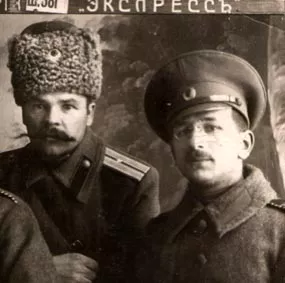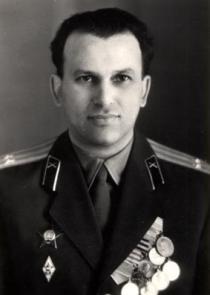To the right my father Ellis Tseitlin, officer of the tsarist army during WW1. The picture was made somewhere in Russia in 1914 and sent to my parents in Smolensk as a keepsake. I do not know who the other person in the picture was.
My paternal grandfather Zalman Tseitlin and grandmother Sara-Kreina Tseitlin lived in an ancient Russian city Smolensk. I still keep certificate of master of bakery belonging to my grandfather. In accordance with that certificate Mstsislaw dweller Zalman Faibishev Tseitlin was given rights and royalties of a guild master as per order of the Emperor. Grandfather was permitted to live in Smolensk not within the Jewish Pale of Settlement.
In 1890 my grandparents got married. Grandfather and his young wife left for England to seek fortune. They had lived in Manchester, England 4 years. Their first child, my father was born in Manchester in 1892. In accordance with the English law, the baby born in England acquires the citizenship of this country. So my father became British citizen. He was called English name Ellis.
In England grandfather worked at the steam engine manufacturing plant as a mechanic. He liked the job very much as it gave him the opportunity to use his potential, but the climate was not OK with him. His health was poorer. The doctor said that he had some sort of lung disease and he was recommended to return to his motherland. Grandparents and their little son came back to Smolensk.
Grandfather bought a house in Smolensk and regained work. Grandparents had three more sons in Smolensk: Haim born in 1897, Aron, born in 1899 and the youngest Samuel in 1901. Children were raised as Jews. They went to cheder. They knew Ivrit and prayers. Jewish traditions were observed at home. Sabbath and Jewish holidays were marked at home. The family belonged to middle class. Grandfather wanted all children to get education, but he did not manage. In 1909 grandfather was stricken with pneumonia and died. He was buried on the Jewish cemetery in Smolensk. There were hard times. Grandmother received some assistance from the Jewish community for the orphaned children. Of course it was rather skimpy as compared with the earnings of the grandfather. She could not even dream of higher education for her children. It was even harder with the outbreak of the WW1. Grandmother Sara-Kreina died in Smolensk in 1919 and was buried in Smolensk Jewish cemetery next to grandfather.
When grandfather was alive my father managed to finish realschule in Smolensk. He worked in the local bank after finishing school. When WW1 began, father was drafted in the army. He was not drafted in specific troops. He was assigned an officer as he was educated. Father was a gun-soldier in the lines. He was wounded in the front and was sent to hospital in Smolensk. It was a hospital for the wounded Jews and all medical workers were Jews. My mother Mariana Havkina worked in that hospital as a nurse. My parents were young. They fell in love with each other and got married shortly after they had met, while father was still being treated in the hospital. They had a traditional Jewish wedding in accordance with the rites.
Having discharged from the hospital, father entered the party of Bolsheviks being captivated with the communist ideas. He was overwhelmed in the revolutionary work. After the Revolution of 1917 father was appointed the deputy head of Smolensk municipal militia. During the Civil War he was appointed the commissar [political officer] of the anti-gang squad, to be more exact the struggle against Makhno gang. Father took part in the Civil War until 1920. Then father was demobilized from the army and was involved in financial and economic work. He was an educated person. There were few people like that back at that time. Parents moved to Moscow before I was born. Father was given an apartment in a large (for those times) 7-storied house in the center of Moscow at Nikitinskiy boulevard.























